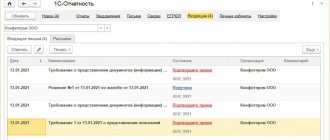The tax office requests a document. The accountant goes to the manager, who goes to his intern, and then it turns out that the counterparty is Vasin, and Vasya quit a month ago. They call Vasya. Vasya says that he handed everything over to the accounting department to Karina, but all his life in the accounting department there were only Anastasia Sergeevna and Katya. They begin to search throughout the company for Karina, and find the great-niece of the general director, who interned in the accounting department in the winter. Karina has already left to study in London and everything that happened in the winter is forgotten for her like a bad dream.
In general, Karina was found, but the documents were not. Next you will have to look for the answer to the question - who and how will be responsible for the lost documents? There is nowhere to go, we will have to act according to the law.
And according to the law, this is how it is:
Absence or non-submission of primary documents
is an offense for which tax and administrative liability is provided (Article 106 of the Tax Code, Article 2.1 of the Administrative Code). The absence of primary documents, invoices, as well as accounting and tax registers is considered a gross violation of the rules for keeping records of income and expenses, and liability for such a violation is provided for in Article 120 of the Tax Code of the Russian Federation.
What tax authorities have the right to request
The list of grounds for the request, deadlines for providing information and the consequences of failure to provide documents at the request of the tax inspectorate are listed in the Tax Code of the Russian Federation and (in terms of liability) in the Code of Administrative Offences.
The Federal Tax Service has the right to request from taxpayers:
- documentation and information about the work of the organization itself - according to the audited period or tax (Articles 93, 126 of the Tax Code of the Russian Federation);
- in relation to counterparties - documents and information on specific transactions or persons (Article 93.1 of the Tax Code of the Russian Federation).
ConsultantPlus experts discussed how to submit documents at the request of the Federal Tax Service. Use these instructions for free.
to read.
What are the deadlines for responding?
The taxpayer is obliged not only to respond, but also to do so within the established time frame. The law stipulates when it is necessary to unsubscribe in order not to receive a fine for a late response to a request from the Federal Tax Service; in 2022 (taking into account the additions to Articles 93 and 93.1 of the Tax Code of the Russian Federation in recent years), the deadlines look like this:
- for documents requested during the inspection - 10 days;
- when checking a consolidated group of taxpayers - 20 days;
- when checking foreign organizations - 30 days;
- provision of information about the counterparty during a counter check - 5 days;
- for a specific transaction - 10 days.
IMPORTANT!
The term “counter check” itself is no longer used in legal acts, but the essence remains the same.
In the law, the deadlines after which liability for failure to provide documents to the tax authorities begins are counted “from the date of receipt of the corresponding request.” And the delivery method matters:
- a request submitted in person or by electronic means is executed within the time specified by law;
- postal - +6 days (from the date the letter was sent by the inspector);
- through the taxpayer’s personal account: +1 day.
Request for documents outside the scope of verification: to submit or not?
Recently, taxpayers are increasingly faced with a problem when the tax authority sends to them a requirement to provide documents and information outside the framework of a tax audit , referring to Art. 93.1 Tax Code of the Russian Federation.
The question arises: “What is this?”
There are desk tax audits. Everything seems clear. In this case, documents may be requested.
There are on-site tax audits. Here they can demand even more.
What kind of form is this “outside the scope of a tax audit?”
How to respond to such a requirement? To submit documents and information or not?
Looking ahead, I will say that requesting documents outside the framework of a tax audit is actually a pre-audit analysis of the company’s activities, when tax officials are just collecting documents about the company and have not yet decided to conduct an audit (on-site or desk) against the company.
So to submit or not to submit documents and information?
Is there liability for failure to provide documents outside the scope of a tax audit?
Responsibility is provided.
This is Article 126 of the Tax Code (200 rubles for each document not submitted), and for unlawful failure to report (untimely communication) of the requested information - Art. 129.1 Tax Code - fine 5,000 rubles.
So, the tax authority has the right to request documents and information outside the framework of a tax audit, and there is a fine.
But what is this procedure “outside the scope of tax control”? Isn’t it possible that now tax officials can at any time request any documents from the taxpayer and conduct an actual desk or field audit outside the scope of a tax audit?
Let's read part 2 of Art. together. 93.1 of the Tax Code of the Russian Federation: if, outside the framework of tax audits, the tax authorities have a justified need to obtain documents (information) regarding a specific transaction, a tax authority official has the right to request these documents (information) from the participants in this transaction or from other persons who have the documents (information) about this transaction.
Key words: “justified necessity”, “obtaining documents (information) regarding a specific transaction”.
Once again: exceptional character, justified necessity and specific transaction.
That is, the Request must indicate during which tax control event the need to submit documents (information) arose , and when requesting information regarding a specific transaction, information allowing identification of this transaction must also be indicated.
And how can these signs be identified in practice? Let us turn to the criterion of truth - judicial practice.
Here is the Resolution of the Federal Antimonopoly Service of the West Siberian District dated July 10, 2014 in case No. A27-12135/2013.
The company refused to provide documents upon request. The tax authority held the company liable in the form of a fine.
The court made a decision: the demand was partially satisfied, since the decision and demand adopted by the inspectorate do not comply with the provisions of the Tax Code of the Russian Federation; the initial request for the provision of documents did not indicate within the framework of which tax control measures the documents were requested and in connection with which information was requested in relation to the legal entity , specific documents are named, and not information regarding the transaction, which may be required outside the framework of a tax audit.
Please note what the court said: “... specific documents are named, and not information regarding the transaction...”
And here is another case: Resolution of the Arbitration Court of the Ural District dated 04/05/2018 N F09-535/18 in case N A50-23230/2017.
Here, too, the taxpayer received a requirement to submit primary documents on transactions with a counterparty.
Didn't introduce it. He was brought to justice. Appealed.
The taxpayer's application was rejected, the court concluded: the tax authority, outside the framework of the tax audit, had a justified need to obtain information regarding the transactions of the taxpayer's counterparty; the request contains the necessary information to determine tax control measures and identify information on the requested transactions.
Also, in the Resolution of the Arbitration Court of the West Siberian District dated 02/03/2017 N F04-7101/2017 in case N A75-6717/2016, the following conclusion was made that when requesting documents (information), the tax authority in the corresponding requirement (instruction) must indicate , within the framework of which specific tax control event (tax audit or other specific tax control event) documents are requested, and when requesting documents outside the framework of a tax audit, also indicate the identifying characteristics of a specific transaction in respect of which information is required.
Satisfying the taxpayer’s complaint, the court indicated that the tax authorities did not specify in connection with which tax control activities it was necessary to submit the requested documents, and, as a result, did not justify the reason for requesting documents for specific transactions. Further, the court pointed out that the contested demand names, among other things, specific documents, and not information regarding a specific transaction that may be required outside the framework of a tax audit.
To complete the picture, let’s read an excerpt from the Resolution of the Twentieth Arbitration Court of Appeal dated October 11, 2016 in case No. A09-72215/2016, in which the court very well described what actually should be indicated in the Requirements.
Here's what the court wrote:
“From the content of the disputed requirement it follows that the tax authority requested information from the Company regarding the activities of Management Company BZKPD LLC regarding a specific transaction, namely the agreement dated 01.09.2015 No. TD/NG/18. In addition, the specified requirement contains a reference to invoices No. 88 dated 10/19/2015, No. 39 dated 09/02/2015 with the specific purpose of payment.
Also in the contested requirement there is an indication that the need to provide information arose outside the framework of the tax audit.
Based on the foregoing, the court reasonably considered that the requirement for the submission of documents (information) dated 04/06/2016 N 51675 complies with the provisions of Article 93.1 of the Tax Code of the Russian Federation, since it contains the number and date of the agreement (N TD/NG/18 dated 09/01/2015), information about that payment under the agreement was made for crushed stone and the indication of the counterparty LLC Management Company “BZKPD”, with which this agreement was concluded.
All of the above information allows the taxpayer to determine tax control activities and identify the requested information. The content of the requirement is unambiguous and understandable, which does not allow us to conclude that it is unenforceable or that there are any difficulties in understanding the content of the document.
Rejecting the applicant’s argument that issuing a demand outside of tax control activities is contrary to the law, regardless of the specifics of the transaction, the appellate court proceeds from the fact that the right of tax authorities to request information outside the framework of tax audits is directly provided for in paragraph 2 of Article 93.1 of the Tax Code of the Russian Federation.”
Well, now, the general conclusion (under what conditions should you submit documents in the case when you received a Request outside the framework of tax control):
- The Requirement should be assessed, taking into account the above, for its legality: it must be made outside the scope of tax control and the tax authority must have had a justified need.
- Next, determine (find) in the Request a reference to the agreement, the period of its conclusion and an indication of the counterparty.
- We transfer only those documents specified in the Requirement . You should not submit documents that are not specified in the request. If they ask you for information, we hand over information, not documents.
- It is necessary to compare the list of requested documents, and if your inspection has asked for more documents, we transfer exactly those documents that are specified in the initial Request.
- If you have been asked to submit documents in a very large volume, and you are not able to prepare such a volume, write a petition to extend the deadline for submitting documents.
- If you are in doubt about whether or not to submit specific documents, you can contact the Federal Tax Service Inspectorate in writing for clarification. You shouldn't be silent. It's better to clarify. And then make an adequate decision in accordance with established practice and the reaction of the courts.
Hello Guest! Offer from "Clerk"
Online professional retraining “Accountant on the simplified tax system” with a diploma for 250 academic hours . Learn everything new to avoid mistakes. Online training for 2 months, the stream starts on March 15.
Sign up
Sanctions for failure to comply with the requirements of the Federal Tax Service
If the response to the Federal Tax Service is not sent or sent at the wrong time, the taxpayer faces tax or administrative fines.
According to Article 126 of the Tax Code of the Russian Federation
If the required documentation was not sent to the Federal Tax Service on time, then the payer can be held accountable under Art. 126 NK; for 2022, the fines for it are as follows:
- 200 rubles for each paper during verification;
- 10,000 rubles for documents on the counterparty;
- 500,000 rubles for failure to respond to the profits and losses of a foreign company.
According to Article 129.1 of the Tax Code of the Russian Federation
Article 129.1 imposes penalties for unlawful failure to report (or untimely communication) information upon request. In this case, the penalty for late response to the tax demand in 2022 is:
- 5000 rub. for the first violation;
- 20,000 rub. for repeating in the same year;
- 50,000 rub. for foreign companies.
IMPORTANT!
The main difference between the two listed articles is that Article 126 is liability for failure to provide documents at the request of the tax authorities, i.e. “papers”, and 129.1 - information. Confusion on this issue sometimes leads to unlawful fines: inspectors assign them on the basis of “which is greater.” Conclusion: if it is not clear from the request what they want from you, clarify.
Other measures of influence
In some cases, failure to provide documentation is not only a tax violation, but also an administrative violation: under Art. 126 of the Tax Code of the Russian Federation is subject to one fine, and according to Article 15.6 of the Code of Administrative Offences, a second fine, from 300 to 500 rubles.
In addition, the Federal Tax Service's arsenal includes forced seizure of documents and information, blocking of accounts, etc. (Article 94 of the Tax Code). Thus, the law allows for late provision of documents to deprive (in fact) the possibility of normal activities.
How officials will respond for the absence of a primary
Administrative liability is provided for officials - a fine in the amount of 300 to 500 rubles. for failure to submit primary documents that are necessary for tax control (part 1 of article 23.1, part 1 of article 15.6 of the Code of Administrative Offenses of the Russian Federation).
If the court considers that there is a gross violation of accounting requirements, including financial statements, they will impose a fine in the amount of 5,000 to 10,000 rubles.
It’s worse if the violation is detected again: a fine of 10,000 to 20,000 rubles. or disqualification for a period of one to two years.
Therefore, if you have already been burned by milk, it is better to start blowing on the water. Check whether the document flow process in the company is convenient for you? Is it worth additionally organizing the work of managers who receive documents from counterparties? Or should we start with automating document return control?
If your organization is a small and medium-sized enterprise, then inspectors can replace an administrative fine to an official with a warning if:
- the violation was committed for the first time;
- no material damage;
- there is no threat of natural or man-made emergency situations;
- there is no harm or threat to the life and health of people, animals and vegetation, the environment, historical and cultural monuments, or the security of Russia.
This is stated in Part 3 of Art. 1.4, part 3 art. 3.4, part 3.5 art. 4.1, Article 4.1.1 of the Code of Administrative Offenses of the Russian Federation. But there will be good will of the inspector.
How to avoid punishment or reduce the amount of the fine
It is possible to cancel the imposed sanctions only through the court (Article 111 of the Tax Code of the Russian Federation). This happens if it can be proven that the organization or entrepreneur is not to blame for the delay or lack of response to the request.
Article 112 of the Tax Code of the Russian Federation specifies circumstances that make it possible to reduce the fine for failure to provide documents at the request of the tax office (no changes were made in 2022, all the rules are old) and aggravating ones.
Objective reasons: too many requests in a short period of time; in most cases, a short delay is taken into account. Mitigating offenses include the first violation, commission of an offense under threat or coercion, etc., the fine in this case is halved.



